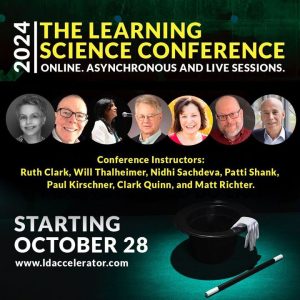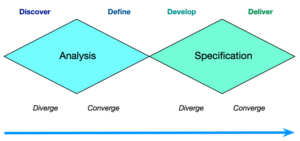I’ve worked with a lot of organizations that train others. I’ve consulted to them, spoken to them, and of course written and spoken for them. (And, of course, others!) And, I’ve seen that they have a reliable problem. Over the years, it occurs to me that these failures stem from a pattern that’s understandable, and also avoidable. So I want to talk about how a training organization fails. (And, realize, that most organizations should be learning organizations, so this is a bigger plea.)
The problem stems from the orgs’ offering. They offer training. Often, certification is linked. And folks need this, for continuing education needs. What folks are increasingly realizing is that much of the learning they’re offering is now findable on the web. For free. Which means that the companies not seeing the repeat business. Even if required, they’re not seeing loyalty. And I think there’s a simple reason why.
My explanation for this is that the orgs are focusing on training, not on performance solutions. People don’t want training for training’s sake, by and large. Sure, they need continuing education in some instances, so they’ll continue (until those requirements change, at least). Folks’ll take courses in the latest bizbuzz, in lieu of any other source, of course. (That’s currently Generative Artificial Intelligence, generically called AI; before that as an article aptly pointed out it was the metaverse, or crypto, or Web 3.0, …)
What would get people to do more than attend the necessary or trendy courses? The evidence is that folks persist when they find value. If you’re providing real value, they will come. So what does that take? I posit that a full solution would be comprised of three things: skill development, performance support, and community.
Part 1: Actual learning
The first problem, of course, could be their learning design. Too often, organizations are falling prey to the same problems that belabor other organizational learning; bad design. They offer information instead of practice. Sure, they get good reviews, but folks aren’t leaving capable of doing something new. That’s not true of all, of course (recently engaged with an organization with really good learning design), but event-based learning doesn’t work.
What should happen is that the orgs target specific competencies, have mental models, examples, and meaningful practice. I’ve talked a lot about good learning design, and have worked with others on the same (c.f. Serious eLearning Manifesto). Still, it seems to remain a surprise to many organizations.
Further, learning has to extend beyond the ‘event’ model. That is, we need to space out practice with feedback. That’s neglected, though there are solutions now, and soon to be available. (Elevator 9, cough cough. ;) Thus, what we’re talking about is real skill development. That’s something people would care about. While it’s nice to have folks say they like it, it’s better if you actually demonstrate impact.
Part 2: Performance support
Of course, equipping learners with skills isn’t a total solution to need. If you really want to support people succeeding, you need more than just the skills. Folks need tools, too. In fact, your skill development should be built to include the tools. Yet, too often when I ask, such orgs admit that this is an area they don’t address.
There are times when courses don’t make sense. There are cognitive limits to what we can do, and we’ve reliably built ways to support our flaws. This can range from things performed rarely (so courses can’t help), through information that’s too volatile or arbitrary, to things done so frequently that we may forget whether we’ve taken a step. There are many situations in pretty much any endeavor where tools make sense. And providing good ones to complement the training, and in fact using those tools as part of the training, is a great way to provide additional value.
You can even make these tools an additional revenue stream, separate from the courses, or of course as part of them. Still, folks want solutions, not just skill development. It’s not about what you do for them, but about who they become through you (see Kathy Sierra’s Badass!).
Part 3: Community
The final piece of the picture is connecting people with others. There are several reasons to do this. For one, folks can get answers that courses and tools are too coarse to address. For another, they can help one another. There’s a whole literature on communities of practice. Sure, there are societies in most areas of practice, but they’re frequently not fulfilling all these needs (and they’re targets of this strategic analysis too). These orgs can offer courses, conferences, and readings, but do they have tools for people? And are they finding ways for people to connect? It’s about learning together.
I’ve learned the hard way that it takes a certain set of skills to develop and maintain a community. Which doesn’t mean you shouldn’t do it. When it reaches critical mass (that is, becomes self-correcting), the benefits to the members are great. Moreover, the dialog can point to the next offerings; your market’s right there!
There’s more, of course. Each of these areas drills down into considerable depth. Still, it’s worth addressing systematically. If you’re an org offering learning as a business, you need to consider this. Similarly, if you’re an L&D unit in an org, this is a roadmap for you as well. If you’re a startup and want to become a learning organization, this is the core of your strategy, too. It’s the revolution L&D needs ;). Not doing this is a suite of training organization fails.
My claim, and I’m willing to be wrong, is that you have to get all of this right. In this era of self-help available online, what matters is creating a full solution. Anything else and you’ll be a commodity. And that, I suggest, is not where you want to be. Look, this is true for L&D as a whole, but it’s particularly important, I suggest, for training companies that want to not just survive, but thrive in this era of internet capabilities.



 In our field of learning design (aka instructional design), it’s too frequently the case that folks don’t actually know the underlying learning
In our field of learning design (aka instructional design), it’s too frequently the case that folks don’t actually know the underlying learning 
